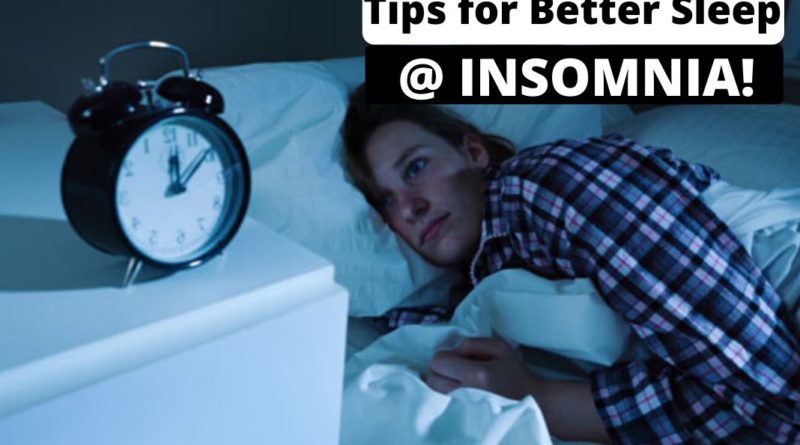Tips for Better Sleep When You Have Insomnia
In times of change, stress or return to routine it is normal to encounter sleeping problems. You may have a hard time falling asleep or staying asleep all night. Or maybe when you wake up you wake up tired and sleepy, even if you have slept enough, and you feel that way all day.
Sleep is a physiological and natural situation of our organism in which we totally or partially lose the ability to respond to external stimuli depending on how deep or not our sleep is.
Insomnia is a sleep disorder consisting of the inability to fall asleep, maintain it, or achieve an adequate duration and quality to restore energy and normal wakefulness.
Insomnia is defined not only by the total loss of sleep time but also by the feeling of satisfaction with the quantity and quality of sleep. At some point in life, you may manifest or have already suffered one of the manifestations of insomnia.
Table of Contents
What consequences can have insomnia?
- Decreased work performance
- The increased auto accident rate
- Greater propensity to suffer from diseases
If you see that you have sleep problems, it is important not to self-medicate and think about what may be causing this possible insomnia.
Tips for better sleep:
- Try to go to sleep each day at the same time: It is important to have a sleep routine and get up at the same time so that the body knows when it is time to relax or activate.
- Practice physical exercise: practicing running or another sport-related to running, does not imply that you also go running in dreams. It could be exhausting, right? You should know that exercise reduces stress and reduces the anxiety that can cause insomnia.
- The blue light on screens: The light emitted by screens causes a reduction in the melatonin we produce, altering our circadian sleep-wake rhythm. So it is important that you install a blue light filter on your devices.
- Total darkness: in the same way that the light from the screens, the small amounts of light that you can have in the room like a lamp or that can enter from the outside also reduces the melatonin that we produce, that’s why it is important to sleep in the dark total.
- Take a hot shower at night
- Write down your concerns: Many times we cannot sleep due to the number of thoughts and concerns we have in mind. A good way to remove them from your head to rest better is to write them down, so you will not keep them in your mind all night.
- Get stressed: do yoga, meditation, or just take a deep breath for 5 minutes, this way you will reduce the accumulated stress a little.
- Do not drink stimulating drinks like coffee or tea in the afternoon or before bed
- Try not to nap because it can make you not sleepy at night
- Do not fall asleep hungry or on a very full stomach
Medicinal plants: options in herbal medicine for sleep
Rather than resorting to medications, it’s better to start with natural things like medicinal plants.
The main advantage of using herbal medicine for the treatment of insomnia is that medicinal plants do not alter the architecture of sleep, allowing you to recover sleep properly and without rebound effect.
Valerian (Valeriana officinalis):
Valerian is part of the Valerianaceae family. From it, the underground parts are used: root, rhizomes, and stalks. These parts are where essential oils with sedative and sleep-inducing effects are found.
Valerian can be used in different doses to relieve nervous tension, relieve mild symptoms of mental stress, and help you fall asleep.
Due to its effects, it is recommended for reducing the time to fall asleep. Although its effects are not immediate, it takes between 2 to 4 weeks of treatment to achieve significant improvement.
Valerian is contraindicated in children younger than 3 years and in children younger than 12 years, there is not yet enough research to recommend its use.
California Poppy (Eschscholzia califórnica):
It is a plant from North America. It belongs to the Papaveraceae family. The action of this plant is sedative, anxiolytic and antispasmodic.
It is indicated for the relief of anxiety and as an aid to fall asleep.
It is not advisable to use it together with benzodiazepines or other sedative drugs, antihistamines or alcoholic beverages due to the possible potentiation of the sedative effects.
This plant is not recommended in pregnancy, lactation or children under 10 years because some of its components may be slightly oxytocic.
In turn, it can affect the driving and handling of machinery, so it should not be taken before these actions.
Passionflower (Passiflora edulis):
Passionflower belongs to the Passifloraceae family. The amount of passionflower that consists of the dried aerial part is used from it.
It contains flavonoids of which isovitexin, isoorientin, vitexin, and orientin stand out, among others. The presence of maltol has also been described.
They have an anxiolytic, calming and spasmolytic activity.
It is indicated to relieve mild symptoms of mental stress and to fall asleep, in case of restlessness, restlessness, and irritability. Because it can cause drowsiness, it is not recommended to use it before driving or operating machinery.
It is not recommended in children under 12 years and should be avoided in people taking benzodiazepines, except under medical supervision.
These are some of the medicinal plants that can be used against occasional insomnia. If insomnia lasts more than 2 weeks after starting treatment with herbal medicine, it is important to see a doctor, as there could be a serious pathology.
In short, to sleep better the first thing is to know your actions well and get to have a sleep routine. If with this you do not get good sleep, you can resort to medicinal plants and if you do not get adequate rest with this, look for other options with a professional.




